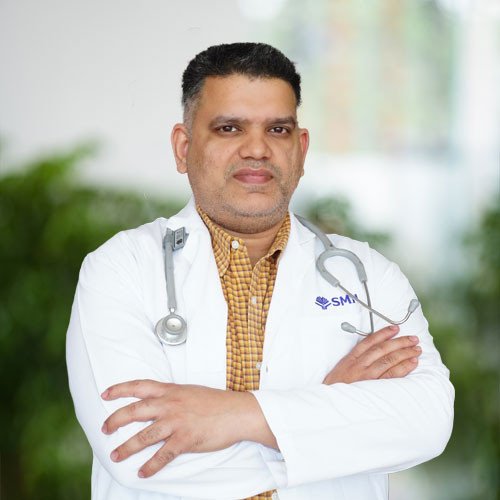About the Department & USPs
Welcome to our hospital's Neurosciences Department, where we specialize in caring for the most intricate organ of all the nervous system. Our dedicated team of neuro experts is committed to providing compassionate and personalized care, harnessing the latest advancements in neuroscience to enhance the well-being of our patients.
Trust us to help you navigate the complexities of neurological disorders with expertise and compassion.
Conditions We Treat
Our highly skilled neuro specialists, advanced technology, and recovery care also provide you with the best medical choices to prevent or treat many conditions, including:
- Arteriovenous Malformation
- Brain embolism
- Brain Abscess
- Brain Hemorrhage
- Brain Aneurysms
- Brain Cancer
- Dural Arteriovenous Fistulas (dAVF)
- Epilepsy
- Alzheimer's disease
- Dementia
- Epilepsy and Other Seizure Disorders.
- Parkinson's and Other Movement Disorders.
- Pediatric Brain Tumor
- Stroke and Transient Ischemic Attack (TIA)
- Multiple sclerosis
- Neurocysticercosis
- Skull based Tumors
- Stroke
- Spina Bifida
- Spinal Trauma
- Traumatic brain injury
- Tethered Cord Syndrome
- Lumbar Disc Collapse
- Cauda Equina Syndrome
- Pituitary Tumors
- Spinal Tumors (Intra & Extra Neural)
- Cervical Spine Stenosis & Myelopathy
- Lumbar Canal Stenosis
- Thoracic Spine Disc Prolapse
- Cervical Disc Prolapse & Radiculopathy
- Cranio-Cervical Decompression for Chiari Malformations
- Congenital Neurological Disorders
- Sciatica
- Neuropathy
- Neurofibromatosis
- Brain tumors (Primary brain malignancies, Meningioma, Metastasis, Other benign tumors)
- Post-Partum Depression
- Autism spectrum disorders
- Attention-deficit/hyperactivity disorder (ADHD)
- Schizophrenia
- Depression
- Anxiety disorders (e.g., generalized anxiety disorder, panic disorder)
- Bipolar disorder
- Obsessive-compulsive disorder (OCD)
- Post-traumatic stress disorder (PTSD)
- Sleep disorders (e.g., insomnia, sleep apnea)
- Neurodevelopmental disorders (e.g., intellectual disability, developmental delay)
- Neurodegenerative disorders (e.g., Huntington's disease, amyotrophic lateral sclerosis)
- Tourette syndrome
- Cerebral palsy
- Bulimia Nervosa
- Anorexia Nervosa
- Pica
- Migraine
- Bing Eating Syndrome
- Drug Abuse
Caring Hands
- Neurologist
- Neuro Surgeon
- Psychiatrist
- Mental Health Counselor

Dr. Siddharth Raghuvanshi
Senior Consultant, Neurology Services
Department
Brain Sciences
Expertise
Stroke | Epilepsy | Headache (Migraine & Others) | Dementia | Cervical/Lumbar Spondylosis

DR. Pushkar Ravindra Ranade
Consultant, Neurosurgery Services
Department
Accident & Emergency, Brain Sciences
Expertise
Brain Tumor Surgery | Spine Surgery | Vascular Neurosurgery | Pediatric Neurosurgery | Minimally Invasive Surgery | Skull Base Surgery | Functional Neurosurgery | Trauma and Emergency Neurosurgery | Stereotactic Surgery | Neuro-Oncology | Peripheral Nerve Surgery | Epilepsy Surgery | Cerebrovascular Surgery | Spinal Cord Tumor Surgery | Hydrocephalus Treatment | Endoscopic Neurosurgery | Chiari Malformation Surgery | Neurocritical Care | Neurotrauma Management | Pain Management Surgery

Dr. Makarand Hirve
Consultant, Neurology Services
Department
Brain Sciences
Expertise
Neurology, Stroke Management, Epilepsy, Movement Disorders, Critical Care Neurology

Dr. Maneesh Shakya
Consultant Neurologist
Department
Brain Sciences
Expertise
Epilepsy | Stroke | Headache (Migraine and others) | Neck & Back pain| Memory loss | Peripheral Neuropathy | Myopathy | Muscular Dystrophy

Dr. Nishant Kumar Shukla
Visiting Consultant, Neurosurgery & Neurointerventional Surgery
Department
Brain Sciences
Expertise
Interventional Neurosurgery, Stroke Intervention, Mechanical Thrombectomy, Brain Aneurysm Treatment, AVM Embolization, Carotid Artery Stenting, Flow Diverter Procedures, Brain Hemorrhage Management, Brain & Spine Surgery, Pediatric Neurosurgery
The field of brain sciences, which includes neurology, neurosurgery, and neuropsychiatry, relies on various technologies to diagnose, treat, and study disorders and conditions related to the brain. Here are some key technologies commonly used in brain sciences medical departments:
- Magnetic Resonance Imaging (MRI)
- Computed Tomography (CT) Scan
- Electroencephalography (EEG)
- Positron Emission Tomography (PET) Scan
- Functional Magnetic Resonance Imaging (fMRI)
- Transcranial Magnetic Stimulation (TMS)
- Deep Brain Stimulation (DBS)
- Neurostimulation and Neuromodulation Devices
- Neurosurgical Navigation Systems
- Neuroinformatics and Brain Imaging Analysis



